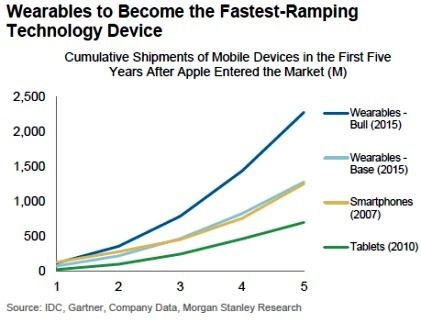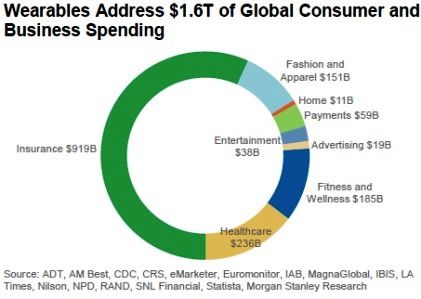When the freshness of the wearable device fades, will the consumer get trapped in the device or be completely disgusted with them? After all, no one wants neighbors to know that they have forgotten to brush their teeth, and when you put the app on your body, it means that the advertiser will leave you alone.
Whether it's hype or not, the Internet of Things (IoT) has proven itself to be an irreversible trend in 2014, as is the wearable device; a Morgan Stanley Blue Paper published last month pointed out that with the object Networking technology is more personal and portable, and wearable devices will be the fastest growing technology device - I don't doubt this.
Morgan Stanley is very optimistic about the market for wearable devices. It is estimated that shipments of such devices will increase from 6 million units in 2013 to 248 million units in 2017 with a compound annual growth rate (CAGR) of 154%. This is twice the forecast for the industry, and the agency said it is still a slightly conservative estimate.
In addition to the above basics, Morgan Stanley also provides forecasts for the market to have a maximum of 1 billion units shipped by 2020; this is based on the organization's adoption of the business (including retail, manufacturing), and consumption. Dependency (from insurance or employers) and optimistic views of new use cases (such as augmented reality).

The number of wearable devices is growing rapidly
(Source: Morgan Stanley Blue Paper)
As many industry observers have predicted long ago, Morgan Stanley also believes that wearable / IoT devices will accelerate growth in industries such as insurance and healthcare. In addition, if manufacturers want to monitor employee productivity and improve processes on the production line, it is a good idea to reach out to every employee through a wearable device, which is beneficial for many companies.

Global consumer and corporate spending totaled $1.6 trillion to IoT devices
(Source: Morgan Stanley Blue Paper)
So what benefits can a general consumer get from a wearable device? I am really confused. What are the opportunities for non-business users to want to ignore the Internet connection device?
The current generation of IoT/wearable devices usually need to be paired with a smart phone or tablet, which is equipped with the ability to interpret the sensor data collected by the personal IoT endpoints and the IoT data at regular intervals. Transfer to the cloud for further analysis. Either way, I am not disgusted with the mix of IoT and smart phones, but the problem is also there - many IoT apps will be "squatting" or "if they are not completely useless". Self-interested.
Maybe I only think so, but I just don't understand why people are so obsessed with various personal health indicators. Many wearable devices on the market are used to track our personal fitness outcomes or health status, including weight, heart rate, blood pressure, sleep patterns, activities, and blood sugar levels; these narcissistic apps can All the data on paper is converted into a neat chart... Yes, your life "snapshot" is packaged into infographics.
Should I be excited about this? Of course, knowing my own general physiological condition may encourage me to live and work normally and exercise more; after seeing my bad sleep pattern chart, I might consider buying a new bed. However, my life still has some invisible faces on the charts that jump out of smart watches or smart phones. Isn't our boss, family, friends and even the government measuring us enough?
I have seen a newly developed toothbrush that lets users know how bad (or how good) they are to brush their teeth. This Oral-B technology toothbrush is embedded with a sensor that communicates with the smartphone. The module, the app on the phone can tell me how to continue brushing for a few minutes, and which teeth to brush a little more.
The above is a best example of relying on the objective IoT device as a personal life coach, but who can explain, what is the fascination that wants to be "guided" in all kinds of small things in daily life? Since leaving the campus, most of us have lived independently, getting rid of our parents' ears, which is one of the biggest reasons why we want to leave home. But now, we want someone - okay, not a person, an app - to remind us of good or bad behavior?
Want a mother to tie a chain around our neck? And for this, we are willing to share with the companies everything that is tracked by the IoT device, let them collect data and analyze it?
Who took our fitness record information?
Then I want to talk about little things about privacy. I really can't understand why there are so many people who have been unable to take out weapons against the lack of protection of personal data collected by IoT devices. For example, for the data broker industry that can get our sensor data, we are currently unable to manage it. You can say that I am paranoid, but there are a few points that we may need to pay attention to.
The Financial Times last month reported a patent application for BodyMedia, a wearable healthcare device company acquired by Jawbone in April 2013, which is linked to the company's "lifeotypes" service. Related; "lifeotypes" is a unique profile that combines instant fitness information with other information such as health records, personal moods or online shopping records.
The most striking part of the above report is that it means that any future wearable device supplier, database provider or data agent industry can establish a combination of our personal data - for example, I have diabetes, I am a pregnant woman, I There are high cholesterol -- and fitness records -- and these files can be used for a variety of purposes such as dieting, predicting disease, and more.
Please note that most of the information we store in the Health Care Mobile App is not covered by the US Health Insurance Portability and Accountability Act. (HIPPA).
At the same time, the US Federal Trade Commission (FTC) is also involved. According to Reuters, the agency believes that most fitness materials are still highly sensitive and are actively investigating those generated by consumers. How data sets are shared, exchanged, and protected. FTC is seeking assurances from Apple that it will be able to avoid collecting sensitive health information through the upcoming Apple Watch smartwatch or other mobile device without the owner's consent.
The Reuters newspaper quoted an anonymous expert as saying that Apple is setting a strong precedent for the privacy of health information. It is understood that Apple requires users to give consent first, the application developer can obtain authorization to obtain the user's health information; in addition, Apple also requires that the information recorded on its smart watch needs to be encrypted.
FTC's investigation of personal data is insignificant. Reuters pointed out that a recent study published by the agency showed that 12 developers of health and fitness action applications would share or sell user information to 76 different Organizational objects, including advertisers.
It's worth noting that Morgan Stanley's optimistic expectations for wearable devices are not idealized. The agency also listed several factors that limit the acceptance of wearable devices: “The wearable device needs Provide data accuracy, attractive design, ease of use, and freedom from smart phones."
I don't care too much about being independent of smart phones, but I think a piece of the report is quite prescient: "Changes in consumer behavior may be more difficult than expected, and consumer acceptance may also be due to device Tired or limited by the limited willingness to share personal information."
Consumers are not so easy to be fooled. When the wearable device is fresh, I guess people's fatigue for this type of device will emerge; you may even decide that they don't want all the neighbors - and those businesses ─ Know that you have not brushed your teeth!
Compilation: Judith Cheng
headphone transformer,smoke alarm transformer,refrigerator low frequency transformer,potted transformer
IHUA INDUSTRIES CO.,LTD. , https://www.ihua-inductor.com